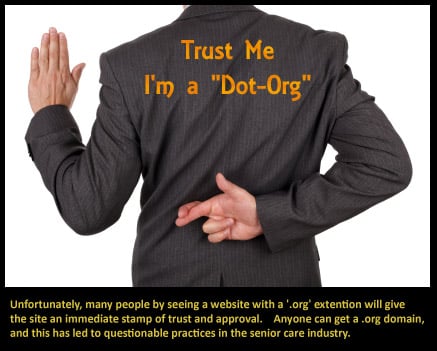Why You Shouldn't Blindly Trust a "Dot-Org"

Summary: Unlike sites that have the .gov or .edu extensions, “Dot-Orgs” are not regulated, and anyone can get them. Unfortunately, many web users blindly trust sites that end in .org, which has led to questionable practices in the senior care industry by site owners who work to capitalize on the misconception that all dot-orgs belong to not-for-profits or charitable entities.
One of the things that bar-none drives me the most nuts about the internet is that so many people blindly trust any website that ends in .org. In much the same way that our culture places people with PhD’s on such a high pedestal – that although they may indeed have a paper stating that they have been blessed with an advanced education, there are, in fact, a percentage of not-so-very intelligent, or perhaps even dishonest or fraudulently-natured ‘doctors’ out there.

Yes, there are many wonderful, smart and successful docs within the ranks of our society. It does not, however, guarantee that all or any of them can be trusted without a little further investigation.
Similarly, there is absolutely nothing about a “Dot-Org” that makes it more trustworthy, noncommercial, or higher quality than a site with any other extension.
I’ve unfortunately seen a rise in not-so-trustworthy senior care and assisted living websites out there playing on this perception that a .org will be their ticket to more referrals and better rankings.
Sadly, a number of them are succeeding at a level that they shouldn’t be based on false pretenses.
According to Wikipedia, .org “…was originally created for non-profits, but today it is commonly used by schools, open-source projects, communities, and for-profit entities.”
It further states that “Anyone can register an org second-level domain. Although org was recommended for non-commercial entities, there are no restrictions to registration.”
So, basically put, although the intent of this extension was to originally identify “noble’ causes such as not-for-profits, schools, and entities whose main goal is other than making money, it has, through lack of being regulated, been taken advantage of.
I would submit that if you were to ask anyone whether they would inherently ‘trust’ information on a .org over a .com, you’d get almost a 100% response in favor of .org.
Why this can be troublesome for the senior care industry
Unfortunately, I’ve seen a growing number of senior care and assisted living sites with the .org extension popping up out there, many of which are entirely commercial, with very little expertise, thought or quality behind them. Even more unfortunate is that they are often times able to rank really well, since other educational and governmental agencies are willing to link to them, and promote them, simply because they have that misleading, but all-too-trusted dot-org extension.
Even more unfortunate is that some of these .org sites are geared solely to collect personal information, to be then resold to any number of third party companies.
Seniors, especially those who may be experiencing mental or cognitive disorders such as Alzheimer’s or dementia, may be especially falling prey to offering up personal information, or be persuaded into a situation that is not in their best interests.
A Few Things To Look For:
If you happen upon a .org, or any website for that matter check to see if any of the following items are happening:
1) Go to the site’s contact page. Is there any hint of where the site is located, and is there an obvious address and phone number? If there is only a ‘contact form’ and no identifiable information about the site’s ownership or headquarters, it may not be a trustworthy site.
2) Authorship: Can you find the name of any expert(s) or contributors who have directly offered their time and input specifically to the website? Do articles identify who wrote them, and do these people have easily findable profiles on sites like google-plus, facebook and twitter – adding to their reputability? If you have no idea who is behind the material on a website, it’s probably best to keep moving.
3) Are pieces of imperative information “hidden” by ads or referral forms, or is it difficult for you to get to the information you need before submitting personal information? If so, it may not be a safe website.
4) Does the website have an obvious and thorough privacy policy, which states that if they do collect information from you, how it will be used, and how you can opt-out? Any trustworthy website will offer a privacy policy.
5) If it is a .org, is there anywhere on the site that states how any income collected through the site will be used, and which ‘non-profit’ it will go to? Is there information about the websites’s 501 (c)(3) or Charity status?
6) Does the website do any advertising at all, and does the advertising or ads dominate the site, and take precedence over the actual ‘content?’ If so, you may want to do further digging on what the intent of the site is.
Assisted Living Directory’s goal over the years has evolved into highlighting ways to do safe senior care research, and offering tips and strategies to avoid making ill-informed decisions, or getting into trouble with questionable websites.
Regardless of how ‘slick’ a site may be, and regardless of what ‘extension’ it ends in, no site should be trusted absolutely without a little ‘questioning of authority.’ We’re not ‘against’ all sites that end in .org (a good friend of mine has several .org websites, and although commercial in nature, are high-quality) – as long as it is clear to the user whether it is a commercial entity or not, and as long as the site has made obvious strides towards building trust with their users and followers
We wish everyone safe and successful research.
Responses to this article:
Comment Soon:
No Obligation
Assisted Living with Why You Shouldn't Blindly Trust a "Dot-Org"


